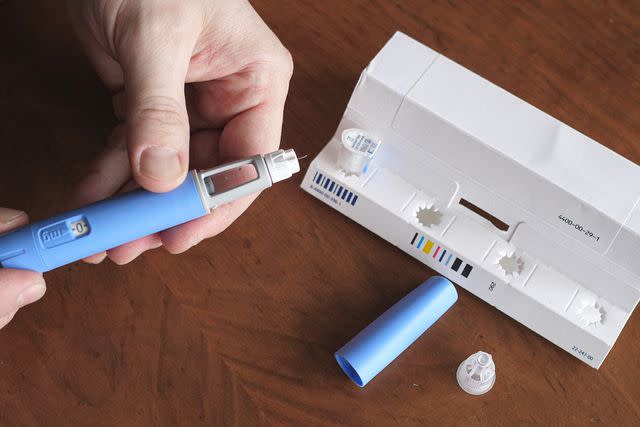'MDLLA''s Tracy Tutor Stopped Mounjaro After 'Projectile Vomiting' Side Effect, Inability to Drink Alcohol
- Oops!Something went wrong.Please try again later.
'Million Dollar Listing Los Angeles' star Tracy Tutor said she stopped using type 2 diabetes drug Mounjaro for weight loss after eight weeks

BauerGriffin/INSTARimages.com
Tracy Tutor is sharing why she stopped using type 2 diabetes drug Mounjaro for weight loss after a short period of time.
The Million Dollar Listing Los Angeles star, 47, appeared on the Jeff Lewis Has Issues podcast where she told host Jeff Lewis that she was previously taking Mounjaro, an FDA-approved prescription medication for people with type 2 diabetes. It's a brand name for tirzepatide, which has been proven to be highly effective for weight loss by reducing appetite and improving how the body breaks down sugar and fat.
Mounjaro is similar to Ozempic and Wegovy — brand names for semaglutide — which work in the brain to impact satiety, and have been trending in Hollywood circles for weight loss.
“I'm not on it anymore. I was only on it for like eight weeks,” Tutor said on the show before Lewis, 53, asked, “Well, how do you maintain it then?”
“I don't know, I'm just starving,” she joked. “No, legitimately, I don't want to lose any more weight, so I just stopped.”
The real estate agent detailed some of the side effects she experienced that also contributed to her decision to stop taking the medication, including her inability to drink alcohol and extreme nausea and vomiting.
“The only thing I could not do was drink, which... projectile vomit,” she said, sharing that she couldn’t have more than two glasses of wine. Tutor then recalled the symptoms becoming so bad that she even threw up while filming MDLLA.

Bryan Bedder/Bravo via Getty Images
“I was shooting the show, actually, and we were shooting the finale, and I had taken the shot like maybe a week before,” she said. “One night we stayed in and we had dinner and I had probably three glasses of wine, maybe smoked a little hooch after, went to bed, woke up, was unwell. Like so unwell.”
“We had to film and I had to put on a big costume. So I am up at the set and there’s 400 people, and they’re all fans of the show and all they want to do is talk, and I am so ill so I keep going to the trailer and hiding in there, and then the production team is calling me out,” Tutor continued.
“Long story short they called me out and they're like, ‘One more scene.’ So I'm talking to a client, and she asked me a question and I just cover my mouth and I turn around and it’s like... it was so intense,” she said while mimicking a vomiting noise. “I was all the way out, like I must've run like 200 feet throwing up the entire way, the whole party like stops, everybody’s looking like ‘What’s wrong with her?’ Super ill. It was a tragedy.”
Lewis then asked if the entire moment was filmed for the show.
“Yeah, they cut that out. It's not really on the brand,” Tutor quipped, “But it wasn't like a hangover. It was legitimately from the shot.”
RELATED: Are Ozempic and Wegovy Safe? All About the Diabetes and Obesity Drugs

The most common side effects with medications like Mounjaro, Ozempic and Wegovy are nausea and diarrhea, and sometimes it can cause vomiting or constipation, Ania Jastreboff, M.D., PhD., an obesity medicine physician scientist at Yale University, previously told PEOPLE.
Additionally, she said that some patients notice a reduced craving for alcohol when on the medications.
“Clinically, I've seen this. Some patients report that they have less desire to drink alcohol. For example, they used to drink a couple of glasses of wine, now they'll drink a half a glass of wine and they don't think to drink the rest of the glass,” she explained. “So it's as if they have the reward, or whatever it is that they were getting from drinking that wine, they have it from a smaller amount. Or they're just not inclined to have a glass of wine.”
Jastreboff believes the drugs may have that kind of effect because they signal the brain via hormones.
“If you think about these medications, the way we think that they work is by working in the brain, and each part of the brain communicates with other parts of the brain,” she told PEOPLE. “So these medications may be impacting parts of the brain that communicate with areas that determine how much reward we get from eating certain foods, consuming alcohol or other things.”
For more People news, make sure to sign up for our newsletter!
Read the original article on People.

